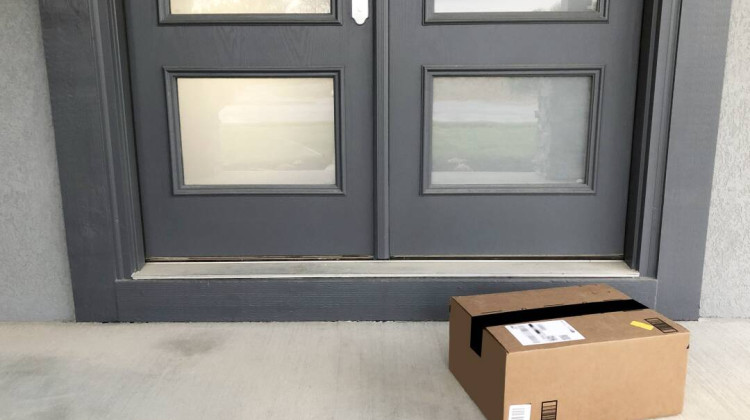
Nola Aigner-Davis is the public information officer for the Polk County Public Health Department. She says their 42-person team is anticipating COVID-19 vaccine distribution to be challenging.
Natalie Krebs/Side Effects Public MediaThe work that people in public health do is often not very visible. It’s usually focused on long-term impacts like improving maternal health and encouraging flu shots. But when the COVID-19 pandemic hit the U.S. last spring, public health workers were thrown into the spotlight seemingly overnight. And this sudden shift has taken a huge toll on them.
Shelley Bickel was supposed to be retired by now.
Following a three-decade public health career in rural southern Iowa, Bickel retired in 2018 — only to be convinced to spend one more year running a neighboring county's department part-time.
But last March, just as Bickel was about to hang up her public health hat for good, the COVID-19 pandemic hit.
"And it just kind of hit us with a vengeance," she says. "And I felt like I couldn't just quit. And so here I am working since March 15, seven days a week non-stop, going crazy."
Bickel said this pandemic is like nothing she’s seen in her entire career. On top of working non-stop for Wayne County, she’s also received a lot of pushback from the community on COVID-19 restrictions.
"Oh, we've been called every name in the book," she says. "And we've been hung up on. We've been threatened."
Bickel isn’t the only public health worker in this position.

Penny Tyynismaa, a nurse with the Tama County Public Health Department, said one parent called so upset about quarantine requirements for school sports teams, he started talking about 1930s Germany.
She recalls, "And I said, 'Hold on for a second. Are you comparing me — are you comparing public health to Nazi Germany?' And he said, 'Yes, I am.'"
Tyynismaa works closely with director Shannon Zoffka, who was barely able to take a few days off to get married last summer.
"I don't think we even realize the amount of stress we're under, the exhaustion," Zoffka says. "I mean, the month of November was so chaotic, with the surge. It was insane."
Many public health workers are facing this kind of incredible pressure at the moment.
Jessi Gold, a professor of psychiatry at Washington University in St. Louis, says not only is the work grueling, but many public health workers have been thrust into the spotlight. That makes them a target for people who are feeling anxious during a very scary and uncertain time.
"The public health official is the face of your job security, your livelihood, not existing," she says. "And so it's displaced anger, because you don't understand why that person took it from you."
And all this has taken a toll on workers. A recent Associated Press investigation shows that more than 180 state and local department leaders across the country have left or been fired during the pandemic. Midwestern states like Iowa, Missouri and Kentucky have been hit hard.
Gold expects many more workers to leave, once things calm down and they’re no longer doing, what she calls, "stopping the bleed."
"But I do think very much so that when the adrenaline settles and this stops, that you go, 'What am I doing? And what was that? And do I like this? And am I valued?'" she says.
This is what concerned Becky Wolf, who heads the department in rural Greene County. She said for months, like many, she and her two public health nurses were working really long hours.
But this fall — once they had got through the worst of the state’s third COVID-19 spike — Wolf had what she calls her pandemic "come to Jesus moment."

"We're not going to be able to last if we don't start taking care of ourselves and try and get a hold of things," she says.
Her team has had to temporarily shelve their overachiever mindset. They now strive to work just eight hours a day, leaving by five p.m.
Part of the reason, she says, is to save energy for the huge logistical challenge of distributing the vaccine.
And it’s not just small departments facing this challenge. Nola Aigner-Davis is with the department in Polk County, where Des Moines is located. She says the 42-person team is also anticipating that vaccine distribution will be hard.
"We know it may take a while," she says. "But once you see that little glimmer, light at the end of the tunnel, you're like, ‘Okay, well, we can do this, we can keep doing this.'"
Aigner-Davis says her department has yet to lose any employees to pandemic stress.
This story was produced by Side Effects Public Media, a news collaborative covering public health.
 DONATE
DONATE






 Support WFYI. We can't do it without you.
Support WFYI. We can't do it without you.